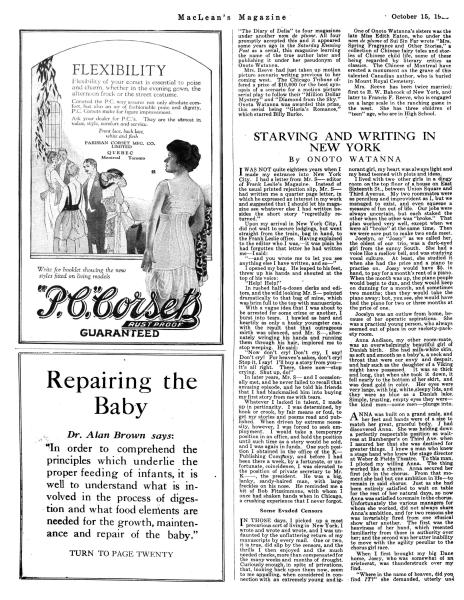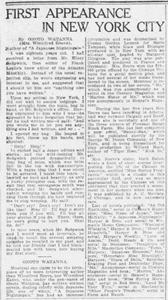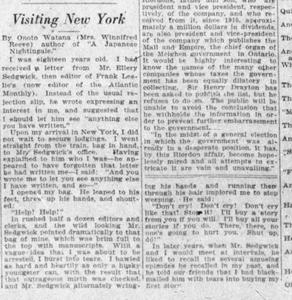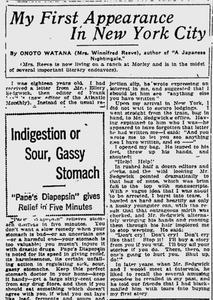I was not quite eighteen years old when I made my entrance into New York City. I had a letter from Mr. S———, editor of Frank Leslie’s Magazine. Instead of the usual printed rejection slip, Mr. S——— had written me a quarter page letter, in which he expressed an interest in my work and suggested that I should let his magazine see whatever else I had written besides the short story “regretfully returned.”
Upon my arrival in New York City, I did not wait to secure lodgings, but went straight from the train, bag in hand, to the Frank Leslie office. Having explained to the editor who I was—it was plain he had forgotten that letter he had written me—I said:
“—and you wrote me to let you see anything else I have written, and so—”
I opened my bag. He leaped to his feet, threw up his hands, and shouted at the top of his voice:
“Help! Help!”
In rushed half-a-dozen clerks and editors, and the wild looking Mr. S——— pointed dramatically to that bag of mine, which was brim full to the top with manuscripts.
With a vague idea that I was about to be arrested for some crime or another, I burst into tears. I bawled as hard and heartily as only a husky youngster can, with the result that that outrageous mirth was silenced, and Mr. S———, alternately wringing his hands and running them through his hair, implored me to stop weeping. He said:
“Now don’t cry! Don’t cry, I say! Don’t cry! For heaven’s sakes, don’t cry! Stop it, I say! I’ll buy a story from you—it’s all right. There, there now—stop crying. Shut up, do!”
In later years, Mr. S——— and I occasionally met, and he never failed to recall that amusing episode, and he told his friends that I had blackmailed him into buying my first story from me with tears.
Whatever I lacked in talent, I made up in pertinacity. I was determined, by hook or crook, by fair means or foul, to get my stories and poems read and published. When driven by extreme necessity, however, I was forced to seek employment. I would take a temporary position in an office, and hold the position until such time as a story would be sold, and I was again in funds. One such position I obtained in the office of the K——— Publishing Company, and before I had been there a week, by a fortunate, or unfortunate, coincidence, I was elevated to the position of private secretary to Mr. K———, the president. He was a big, lanky, sandy-haired man, with large freckles on his nose. He reminded me a bit of Bob Fitzsimmons, with whom I once had shaken hands when in Chicago, a crushing experience I never forgot.
Some Evaded Censors
In those days, I picked up a most precarious sort of living in New York. I wrote and wrote and wrote, and I was undaunted by the unflattering return of my manuscripts by every mail. One or two, it is true, did slip by the censors, and the thrills I then enjoyed, and the much needed checks, more than compensated for the many weeks and months of drought. Curiously enough, in spite of privations, that, looking back upon them now, seem to me appalling, when considered in connection with an extremely young and ignorant girl, my heart was always light and my head teemed with plots and ideas.
I lived with two other girls in a dingy room on the top floor of a house on East Sixteenth St., between Union Square and Third Avenue. My two roommates were as penniless and improvident as I, but we managed to exist, and even squeeze a measure of fun out of life. Our jobs were always uncertain, but each staked the other when the other was “broke.” That plan worked very well, except when we were all “broke” at the same time. Then we were sore put to make two ends meet.
Jocelyn, or “Jossy” as we called her, the oldest of our trio, was a dark-eyed girl from the sunny South. She had a voice like a mellow bell, and was studying vocal culture. At least, she studied it when she had the price and a piano to practise on. Jossy would have $5 in hand, to pay for a month’s rent of a piano. When the month was up, the piano people would begin to dun, and they would keep on dunning for a month, and sometimes two months; then they would take the piano away; but, you see, she would have had the piano for two or three months at the price of one.
Jocelyn was an outlaw from home, because of her operatic aspirations. She was a practical young person, who always seemed out of place in our rackety-packety room.
Anna Andison, my other room-mate, was an overwhelmingly beautiful girl of Danish birth. She had milk-white skin, as soft and smooth as a baby’s, a neck and throat that were our envy and despair, and hair such as the daughter of a Viking might have possessed. It was so thick and long, that when she took it down, it fell nearly to the bottom of her skirt, and was dead gold in color. Her eyes were very large, with big, white, sleepy lids, and they were as blue as a Danish lake. Simple, trusting, empty eyes they were—the kind men— some men—plunge into.
Anna was built on a grand scale, and her feet and hands were of a size to match her great, graceful body. I had discovered Anna. She was holding down a perfectly respectable position as waitress at Bamberger’s on Third Ave. when I assured her that she was destined for greater things. I knew a man who knew a stage hand who knew the stage director at Weber & Fields Theatre. To this man, I piloted by willing Anna. The thing worked like a charm. Anna secured her first job in the chorus. From that moment she had but one ambition in life—to remain in said chorus. Just as she had been entirely satisfied to wait on table for the rest of her natural days, so now Anna was satisfied to remain in the chorus. Unfortunately the various managers for whom she worked did not always share Anna’s ambition, and for two reasons she was invariably fired from one musical show after another. The first was the heaviness of her hand, which resented familiarity from those in authority over her; and the second was her utter inability to move with the agility peculiar to the chorus girl race.
When I first brought my big Dane home, Jossy, who was somewhat of an aristocrat, was thunderstruck over my find.
“Where in the name of heaven, did you find IT!” she demanded, utterly un-
67moved by the guileless, trusting, and most friendly smile of the fair Anna.
In fact Jossy’s unreasonable attitude was not dissimilar from the one she had assumed when I returned home one evening with a half-frozen kitten I had found shivering in the street. She said then there was no space in our room for cats and kittens. Anna, however, was no kitten. In point of fact she resembled more a big, blonde bear.
“This is my friend, Anna Andison,” said I, defensively. “She looks to me like a picture I once saw of Queen Guinevere, and I’m going to make her famous. I know a man who knows a man who——”
“I tarnk you,” murmured Anna, with the most touching and childish gratitude.
“Where are you going to put IT in this room?” demanded Jocelyn fiercely. “I want that corner where she’s standing for my piano that’s coming to-day.”
“Darts all ride,” said Anna, smiling agreeably, “I yust set on dar bed.” And “set” she did, causing that rickety affair to creak alarmingly.
She proved, however, from the very first, a most valued addition to our family. Our landlady was extremely stingy about bed clothes, and the two near-woolen blankets on the bed never really kept us warm. Anna was a human furnace. She was better than any hot water bottle or hot water bag ever invented. Snuggled up against her I slept as snug as the proverbial “bug in a rug.” That first night I slept between my two friends, a sort of dividing link between them, but the next day, expatiating loudly upon the beautiful warm sleep I had enjoyed, the shivering Jocelyn (she came from Tennessee, and had never been entirely acclimated to New York’s humidity and cold,) bitterly suggested that I was a pig to try and keep a good thing all to myself. So that night, Anna slept between us, and I never heard Jossy after that object to her presence in our home.
Our Efforts to Get a “Square”
So there we were, the three of us, making two ends meet on practically nothing, and using our wits a good part of the time to save us from starvation. Some of the ways and means we resorted to, it is true, might not have been considered ethical by our more affluent sisters, but poverty, in a way, is a state of warfare, and we are assured that “All is fair in love and war.” Some of the devices for obtaining a square, or half or even a quarter of a square meal were ingenious and very often disastrous. Most of our efforts however met with unqualified success. Youth and bright wits are a combination that Fate finds it hard to beat.
For instance: On the first—the parlor—floor of our residence, there dwelt a prosperous man of whose wealth and generosity and susceptibility toward the weaker sex we heard much from our sometimes garrulous landlady. He had cast a sentimental and appraising eye on our Anna, and had made sufficient inquiries concerning her to induce our landlady to climb the four flights of stairs to our room to tell us all about it.
From that day, the man on the parlor floor was marked as a possible meal ticket, not merely for Anna, but for us. We aided and abetted by every means in our power his suit, or rather, I should say, our suit. In due time he invited Anna to go to a dinner and dance with him. Anna accepted, of course. I had told her to, and she was an obedient and grateful creature and looked upon me, humbly, in the light of a benefactor.
The three of us then put our heads together to consider the problem of a dress for Anna, for Anna possessed but one, and that hardly of a kind calculated to charm a desirable suitor. Accordingly I generously tendered to Anna my own sole party frock. It was pink and fluffy, and I was small and dark, and, therefore, showed up well in it. At that time, I weighed about a hundred pounds. Anna tipped the scales at close to a hundred and eighty. Jossy, however, was a genius with the needle. She let down that dress at least a half a foot. I, then, took Anna in hand, and, attaching her by her corset strings to the bed, I bade her pull. She pulled as hard as only a great Dane could. Presently we had her firmly encased in that dress, and, like proud mothers, we led her below to her waiting man.
That evening Jossy and I spent talking over the things we liked best to eat. I was partial to lobsters, welsh rabbit, hot dogs, chop suey, pancakes, pastry, sardines, pickles, spaghetti, and cheese. Jossy said that the mere thought of a rare porterhouse steak entirely surrounded by onions made her teeth water. As for mushrooms—the thought of mushrooms and corn made Jossy so homesick that she was ready to give up her musical career, till I talked her out of it, or, rather back to it.
We Wait for Anna
Talking about food aggravated our situation, and we hungrily watched the clock for Anna to return. She had given us her solemn word of honor—crossed her neck and crossed her heart, wished she might die a horrible death if she didn’t, etc.—that she would order without stint at the dinner hour, and that she would stow away in her own ample insides only one third of the dinner. The remaining two- thirds she was to surreptitiously confine to the capacious bag with which we had provided her and which was to mask as a handkerchief holder.
At ten, there was no sign of Anna, so Jossy suggested that we should go and look for her. She declared that, in a way, we were Anna’s guardians and chaperones and it was not proper for a young and innocent girl to be out alone at night with a man. They never did such things in Tennessee, Jocelyn assured me solemnly.
So we two sallied forth, and arrived duly at the dance hall, which was above a well-known German restaurant of the East Side. We were some time in discovering our Anna, for she was backed up against a wall, hidden by a solid mass of admiring and besieging males. I could see at once that my dress had made a hit. Foremost in this crowd of Anna’s admirers was the man from the parlor floor.
Anna “Busts” at the Back
As we approached nearer to this mob we saw that Anna was in evident trouble. As soon as she saw us, a guttural exclamation of appeal escaped her lips. Whenever Anna was unduly moved by emotion or excitement, she invariably forgot the exquisite accent I was painstakingly teaching her, and lapsed into a sort of English version of her mother tongue. Now as we pushed our way through the crowd and came directly to her, she whispered hoarsely in my ear;
“I ban busted!”
“You ban what?” I whispered back, hoarsely also.
“I ban busted. I ban busted on dam corset, and I ban busted on dam dress on dam back.”
I know that backless evening gowns are now the vogue, but it was not so in my young days. I realized at once the fatal sensation and disgrace that would befall us should Anna turn around. Jocelyn, the practical and resourceful in all crises, pushed me aside, and hissed:
“Faint! Faint! Faint, you fool! Don’t you understand? I say, faint! Faint, you big slob. Fall over. Pretend to die!”
A Meal Ticket At Last
When at last it percolated through Anna’s skull that a swoon might save the day for us, she fell promptly backward with such a crash that I am sure she nearly broke the arm of the man from the parlor floor, who nobly sprang to her rescue.
There she lay in a dead faint on the floor, her rosy face upturned and her ruby lips parted widely as she breathed through them stertorously.
Luckily for our fortunes, soon after this, the Dutch delicatessen man on Third Avenue fell passionately in love with Anna, and for a time we lived upon the fat of the land. I made up a rhyme which we sang to the tune of “Just before the Battle, Mother.” Jossy would sit at the head of the stairs when Anna’s beau was calling, and she would croon in her deep, heart-reaching contralto:
Don’t forget the cheese and butter,
Don’t forget the bread and jam;
Don’t forget the pickles, Anna,
And the piece of ham.
Goodbye, Anna, we shall never,
Eat a little bite till you get back,
But you’ll not forget us, Anna,
When you fill your little sack.




